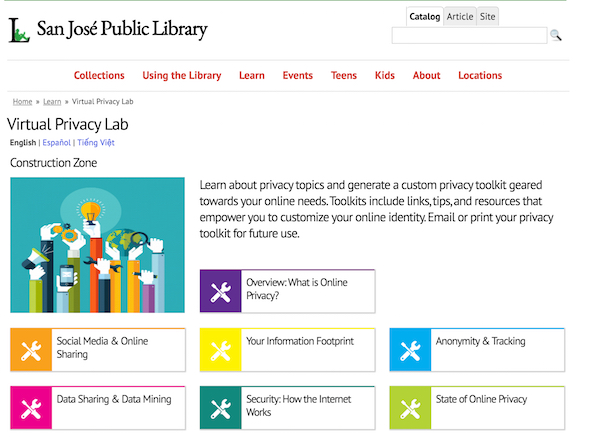Making it Easier for Students to Learn About Privacy Online
- March 22, 2016
- By Elisabeth Morgan
During last week’s “Privacy in the Digital Age” conference, librarians from around the country discussed how libraries can better protect and educate their students and patrons about living online safely. In his keynote speech, Director of Intellectual Freedom at the American Library Association James LaRue, told the story of a librarian who didn’t know how to respond to a police request for information about what one of her students had been reading in the library.

“There is a tremendous amount of responsibility on librarians today,” said LaRue, ultimately advising her to consider whether she wanted to keep records like this on her students in the first place, and then to weigh the cost of evading their privacy policy and potentially losing their community’s trust over fulfilling the request. In the end, she didn’t disclose what the student had been reading… a decision that, at some schools, could have cost her a job.
Librarians have a long history of providing a safe space and guidance for private research. It’s part of every citizens rights to be able to learn about whatever public information they’d like, without answering to a third party. But today, loads of information about us is logged online everyday as we leave a digital footprint on each site that we visit. So what roles do librarians continue to play in protecting their online readers and researchers?
In Part II of our recap of the conference, a librarian at in San José, California, discussed the library’s efforts to educate their patrons about privacy in an engaging way. If you’d like to watch recording of each presentation, they are here on YouTube.
Educating Your Community About Privacy in an Engaging Way
Learning about online privacy in generally overwhelming, scary and boring, said Julie Oborny, web-librarian at San José Public Library. But at the same time, according to a recent Pew study, 93% of adults are concerned about who can get information about them. Motivated by this divide, this library set out to answer the question: How can we empower people to make informed privacy decisions about online privacy issues?
Oborny and her team were granted a Knight Prototype Grant of $35,000 to develop a tool to educate people about privacy issues. They started by researching their community, and came up with four main themes. People wanted to know who was using their info, how they were using it, what they did with it, and how they should protect themselves.
While they were considering these questions, they brainstormed about how to present the solutions in an engaging way, and immediately though “gaming.” They decided to team up with the International Computer Science Institute and San Jose State University’s Game Dev Club, and came up with a responsive and interactive game that would teach people about privacy based on their individual needs.
In the game, a little “Mario-style” robot moves through a path that asks questions about their social media use, research goals, age, and other factors, and then teaches players about privacy practices based on their response.
The game only covered one of their privacy topics, though, and they had limited time and resources to finish developing it completely. They shifted their efforts into a Virtual Privacy Lab, a site that provides a wealth of information about protecting your privacy online, and that is also responsive to individual needs and values. With the site, you can target privacy goals within social media, data sharing, or the state of online privacy, and then build a privacy “tool kit” that’s built on a series of questions about how you want to manage your digital footprint.
This is a great resource for older students and librarians and teachers who want to brainstorm talking points about privacy that they might start posing to their students. For younger researchers, Oborny suggested the International Computer Science Institute’s Teaching Privacy program.

By asking questions, teaming up with designers and developers, and applying for grants, this librarian was able to reach their goal of making privacy more transparent to the public. On a closing note, Oborny urged librarians to reach out to their own communities about what they want, and to other technologically savvy librarians to help reach those goals. She also said to contact the San José Public Library at anytime for tips on setting up your own Virtual Privacy Lab.